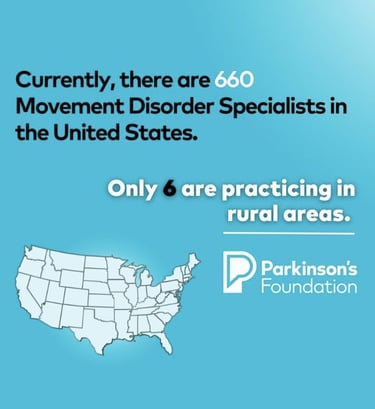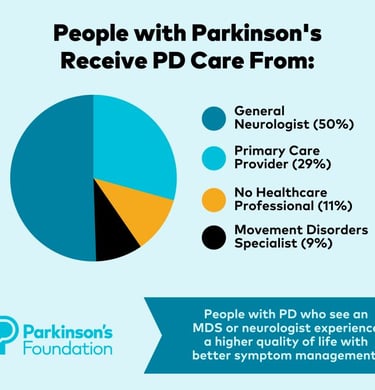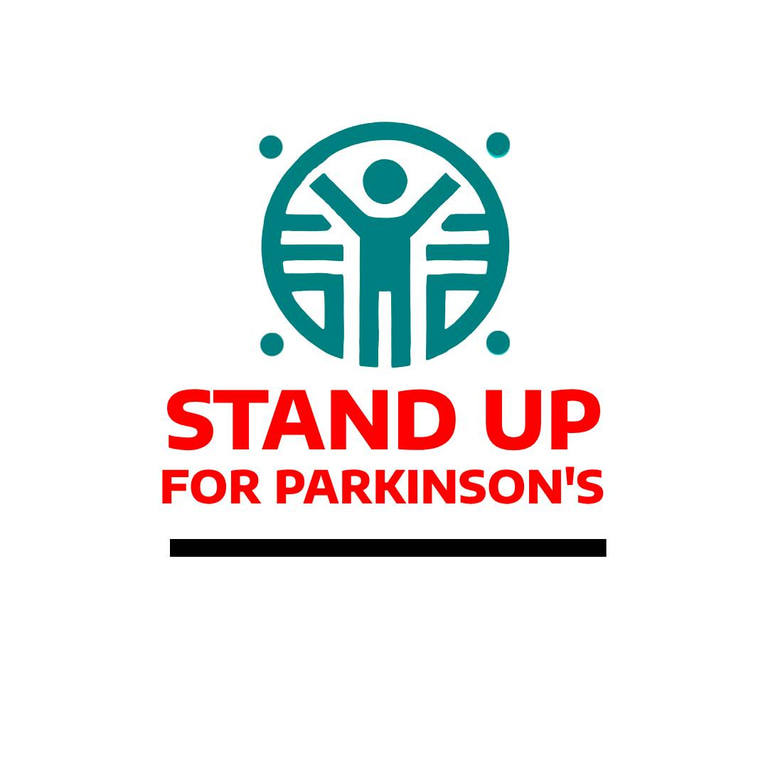Join me in challenging stigma, building awareness, and creating community for over 110,000 Canadians living with Parkinson’s.




Most people are diagnosed with Parkinson’s by their primary care doctor or a general neurologist. If possible, the next step should be to see a movement disorder specialist (MDS), a neurologist with advanced training in Parkinson’s and related conditions. However, MDS doctors are typically located in larger cities, which may mean traveling long distances for appointments a few times a year. Additionally, there is often a long waiting list to see one, so it’s best to get a referral as soon as possible.
Do You Need to See an MDS to get quality Parkinson's care?
The simple answer is no. Would it be ideal to have the best MDS possible? Yes. But can you live well with Parkinson's without one? Yes. In nearly all cases, generalized care is better than no care. And often, a care provider with whom you have a long relationship and who has a strong familiarity with your health background can often provide insight into your care that an MDS might overlook.
The Benefits of Having a Movement Disorder Specialist
Still, all that said, if you are fortunate enough to have access to an MDS, there are plenty of good reasons to include them on your care team. Here are five ways that seeing an MDS can be helpful:
Diagnosis. An MDS is trained to identify the differences between Parkinson's and Parkinsonisms, so seeing a specialist can help make sure your diagnosis is accurate.
Treatment optimization. An MDS's experience treating many people with Parkinson's can help them optimize medications faster. Many care providers will be familiar with carbidopa-levodopa, but there are many formulations of levodopa, and more are on the horizon. Some providers may be less familiar with which formulations might be best for your specific circumstances. Additionally, an MDS often has a broader network of allied health providers who are familiar with Parkinson's, so they may be able to provide better referrals for your related health needs.
Non-motor symptom recognition. An MDS may be more familiar with non-motor symptoms of Parkinson's than providers who have not specialized in Parkinson's. These symptoms can have significant effects on quality of life, and there are often treatments that can help minimize these symptoms.
Advanced treatments guidance. An MDS can help you consider the range of advanced treatments like Focused Ultrasound, deep brain stimulation (DBS), and Duopa. Even if you don't need advanced treatments today, having an established relationship with an MDS can help minimize delays in accessing these treatments if the need arises.
Familiarity with recent research developments. An MDS will be more familiar with recent research in Parkinson's and what clinical trials are ongoing that might be appropriate for you to consider.


What is the difference between a Neurologist and a Movement Disorder Specialist
A neurologist treats a wide range of neurological conditions, while a movement disorder specialist is a neurologist who focuses on movement disorders and has additional training in these conditions:
Training
A movement disorder specialist is a neurologist who has completed a fellowship in movement disorders, which is usually one to two years of additional training.
Focus
A neurologist can treat over 100 neurological conditions, including headaches, seizures, and stroke. While a movement disorder specialist focuses on movement disorders like Parkinson's disease, tremors, and dystonia.
Expertise
A movement disorder specialist has extensive knowledge of movement disorders, including therapies, research, and medications. They can also help manage non-motor symptoms, administer injections, and program DBS.
Care
A movement disorder specialist can tailor a care plan to a patient's specific needs and symptoms. Patients who see a movement disorder specialist often feel better informed and better able to manage their symptoms. A general neurologist provides broader care for a wide range of neurological conditions,, but may not have the specialized focus on movement disorders.
Movement Disorders Clinic at Toronto Western Hospital: Part of the University Health Network, this clinic specializes in diagnosing and treating movement disorders like Parkinson's disease
Morton and Gloria Shulman Movement Disorders Clinic at Sunnybrook Health Sciences Centre: Assesses, diagnoses, and treats movement disorders
Movement Disorders Centre at St. Michael's Hospital: Provides care for patients with movement disorders
Movement Disorders Clinic - Toronto Memory Program: Focuses on clinical diagnosis and management of movement disorders, including Parkinson's disease, essential tremor, and restless leg syndrome
Where to start looking


Parkinsons Canada Carefinder
Hospital clinics in Toronto


Movement Disorder Specialists


Do You (Really) Need a Movement Disorders Specialist for Parkinson’s Care?
